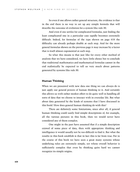So even if one allows rather general structure, the evidence is that in the end there is no way to set up any simple formula that will describe the outcome of evolution for a system like rule 30.
And even if one settles for complicated formulas, just finding the least complicated one in a particular case rapidly becomes extremely difficult. Indeed, for formulas of the type shown on page 618 the difficulty can already perhaps double at each step. And for the more general formulas shown on the previous page it may increase by a factor that is itself almost exponential at each step.
So what this means is that just like for every other method of analysis that we have considered, we have little choice but to conclude that traditional mathematics and mathematical formulas cannot in the end realistically be expected to tell us very much about patterns generated by systems like rule 30.
Human Thinking
When we are presented with new data one thing we can always do is just apply our general powers of human thinking to it. And certainly this allows us with rather modest effort to do quite well in handling all sorts of data that we choose to interact with in everyday life. But what about data generated by the kinds of systems that I have discussed in this book? How does general human thinking do with this?
There are definitely some limitations, since after all, if general human thinking could easily find simple descriptions of, for example, all the various pictures in this book, then we would never have considered any of them complex.
One might in the past have assumed that if a simple description existed of some piece of data, then with appropriate thinking and intelligence it would usually not be too difficult to find it. But what the results in this book establish is that in fact this is far from true. For in the course of this book we have seen a great many systems whose underlying rules are extremely simple, yet whose overall behavior is sufficiently complex that even by thinking quite hard we cannot recognize its simple origins.




